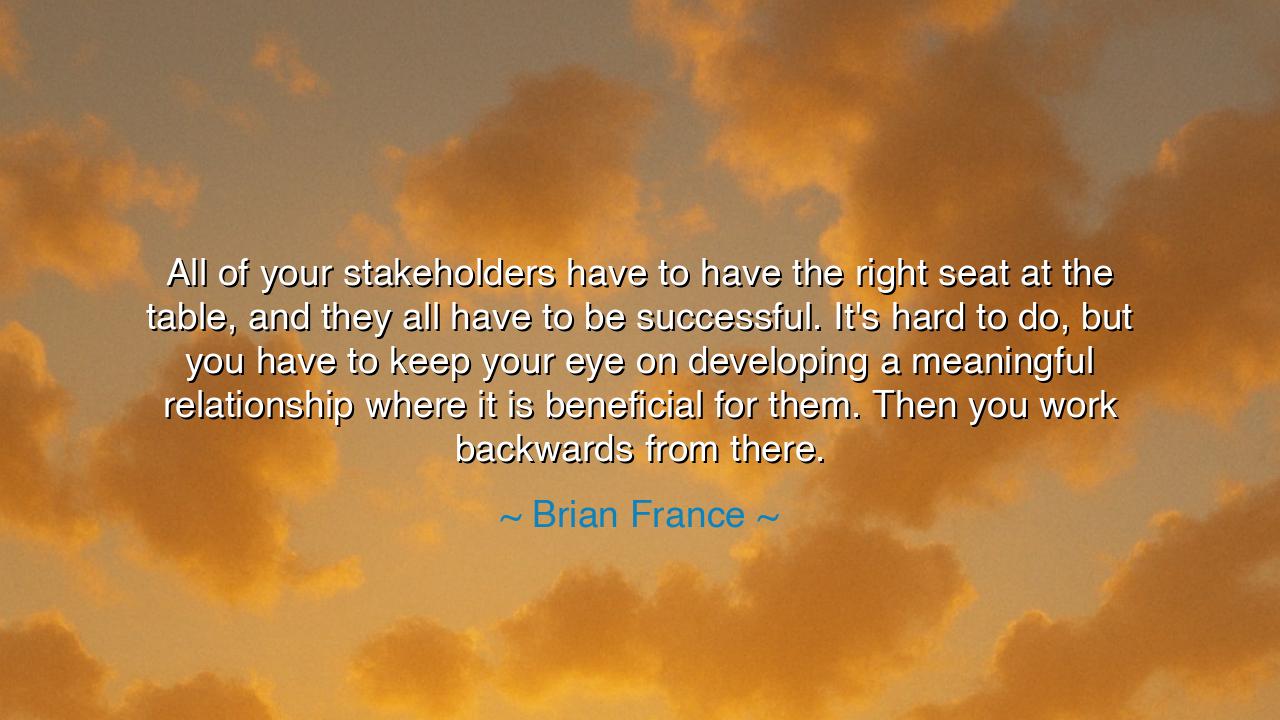
All of your stakeholders have to have the right seat at the
All of your stakeholders have to have the right seat at the table, and they all have to be successful. It's hard to do, but you have to keep your eye on developing a meaningful relationship where it is beneficial for them. Then you work backwards from there.






The leader of enterprise, Brian France, once declared: “All of your stakeholders have to have the right seat at the table, and they all have to be successful. It’s hard to do, but you have to keep your eye on developing a meaningful relationship where it is beneficial for them. Then you work backwards from there.” In this utterance he reveals the ancient law of leadership—that the strength of any venture is not in the might of one, but in the harmony of many. To gather stakeholders is to summon an assembly of forces, and to give each the right seat is to establish order, respect, and purpose.
For the table is more than wood and stone; it is the symbol of unity. Around it, the voices of power, labor, and vision must sit together as equals, each honored for their part. When one is neglected, discord arises; when all are granted place and dignity, harmony prevails. Thus, France teaches that the mark of true governance is not the dominance of one voice, but the weaving of many into a single song of progress.
Yet, he does not hide the difficulty. “It’s hard to do,” he admits, for ambition, pride, and fear often fracture such unity. But the path forward is through the forging of meaningful relationships—not shallow bargains, but bonds where each finds true benefit. The wise leader asks not only, “What do I gain?” but, “How do they flourish?” In lifting others, he ensures that the whole edifice stands strong, rather than crumbling under the weight of inequality.
The teaching continues: once the goal of mutual success is clear, the leader must work backwards. This is the wisdom of the strategist, who envisions the summit before taking the first step. Knowing that all must thrive, he traces the path from that destiny, carving each decision with the end already fixed in sight. Thus, vision is not dream alone, but discipline in reverse—beginning with the triumph of all, and then building the road that leads to it.
So let this lesson be passed down: in every gathering of men, in every council of power, give each their right seat. Seek not only your own gain, but the flourishing of all. For in relationship, mutual and just, lies the key to lasting success. And remember—the wise do not stumble forward blindly, but work backwards from the vision of harmony, ensuring that all who sit at the table rise together in victory.






BPTa Bich Phuong
This quote makes me wonder about the practicality of building these meaningful relationships. In large companies, it seems like some stakeholders would be left out of these discussions. Is there a strategy for ensuring that everyone gets a chance to influence the final decision? Or do some stakeholders inevitably become less involved?
VVy
The idea that all stakeholders must be successful is great, but isn’t it a bit unrealistic to expect success from every individual involved? Some stakeholders might not be as aligned with the core goals of the organization. How can we foster success in those situations, especially when their priorities differ from the company’s?
TLNguyen Thi Le
I can see the value in Brian France’s words, especially about working backward from a beneficial relationship. But how can we guarantee that these relationships will last, especially in a fast-changing business environment? Wouldn't the dynamic nature of business require constant adjustments to the stakeholders' positions at the table?
SDSang Dao
I think this quote highlights a very strategic approach, but it made me wonder: how do you avoid prioritizing one stakeholder's interests over another’s? Balancing the needs of everyone at the table sounds complicated. How can you ensure that the decision-making process remains fair and equitable when working with diverse groups of stakeholders?
THNguyen Thi Thu Huyen
I agree that developing meaningful relationships with stakeholders is crucial for long-term success. But isn't it also essential to regularly check if those relationships remain mutually beneficial? What happens if one party starts feeling overlooked or unimportant? Keeping an eye on everyone’s success seems like a full-time job, but it’s necessary to avoid breakdowns in collaboration.